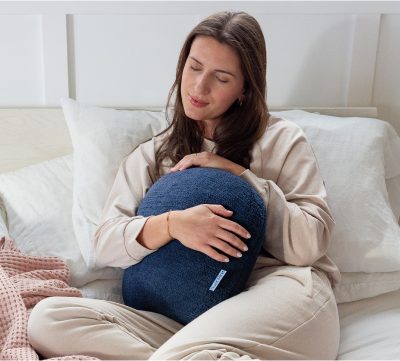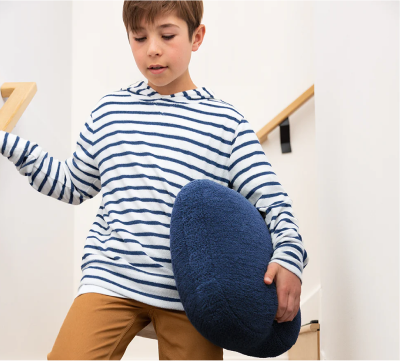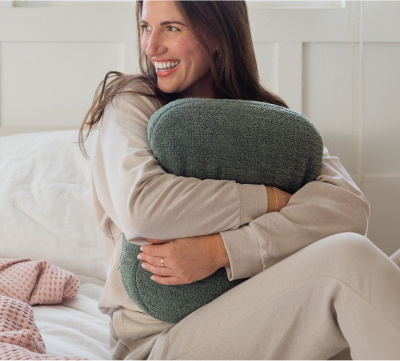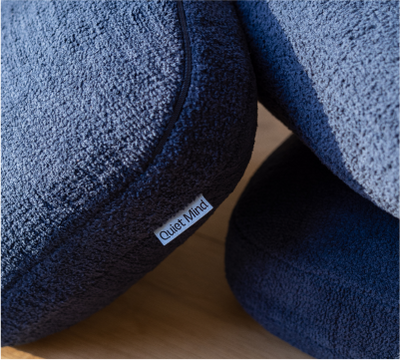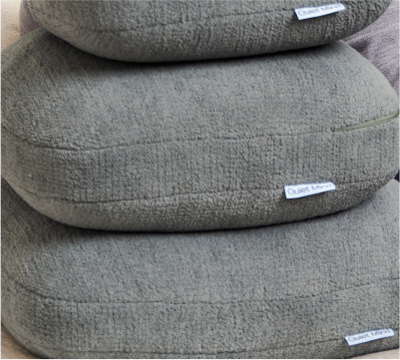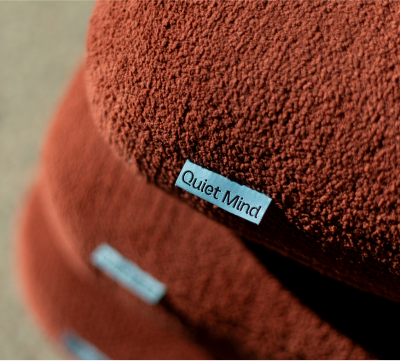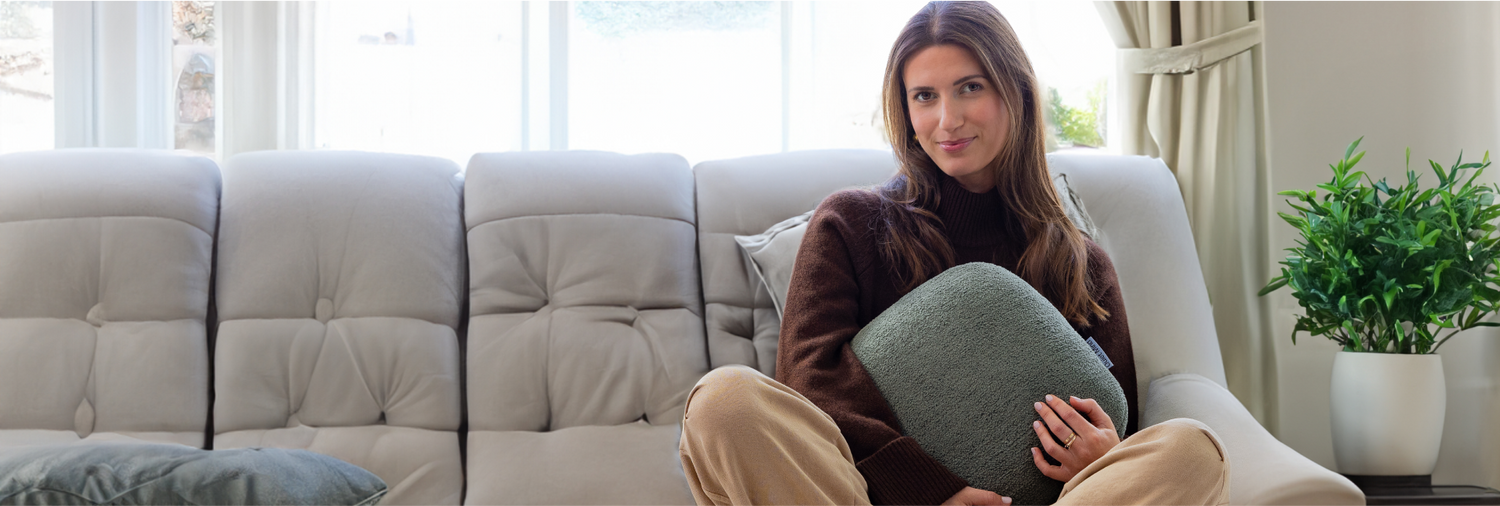It’s late. The lights are out. But your thoughts are loud. You've followed your usual routine: no screens, chamomile tea, maybe a warm bath. Still, your body resists rest.
If you're lying in bed wondering, “Why can’t I sleep?” you’re not alone. Millions of people struggle with falling asleep, waking up too early, or feeling tired even after a full night in bed. While occasional restlessness is normal, persistent trouble sleeping may point to chronic insomnia, a common sleep disorder that affects your sleep habits, mental health, and daytime energy.
The good news? You can shift these patterns. With insight, consistency, and gentle adjustments, you can improve your sleep and reclaim the rest you need.
Common Causes That Keep You Awake
The question: why can’t I sleep? rarely has one answer. More often, it’s a quiet accumulation of stressors; some obvious, others invisible.
Stress, Anxiety & Overthinking
When the body is stressed, the nervous system stays in a state of alert. Even in a quiet room, cortisol levels remain high, keeping you awake. You might lie there cycling through conversations, to-do lists, or fears of not sleeping.
This anxiety about sleep itself can become a cause of your sleep disruption. Learning how to calm your nervous system at night using techniques like breathing exercises, body scans, or journaling can help you fall asleep or stay asleep more easily.
Poor Sleep Environment & Hygiene
Poor sleep habits may be quietly interfering with your body’s natural readiness for sleep. Your environment sends cues to your brain about whether it’s safe to rest.
|
Sleep Environment Factor |
Ideal Condition |
Why It Matters |
|
Temperature |
60–67°F (15–19°C) |
Helps regulate melatonin, a key sleep aid |
|
Light |
Total darkness at bedtime |
Supports your natural circadian rhythm sleep |
|
Noise |
Stillness or white noise |
Reduces nighttime interruptions |
Consistently going to bed and waking up at the same time daily helps strengthen your internal clock and improve your sleep schedule, even on weekends.
Diet, Caffeine, Alcohol & Medications
What you eat and drink during the daytime can affect your ability to sleep at night. Stimulants like caffeine (especially late in the day) delay your time to sleep, even if you feel sleepy. Alcohol may help you unwind initially but disrupts deeper stages of sleep, leading to sleep you need feeling out of reach.
Medications, including some used to treat anxiety, depression, or ADHD, may also affect your sleep. If you can’t fall asleep, or wake often during the night, review your prescriptions with a healthcare provider.
Hidden Medical and Psychological Factors
When improving your sleep environment and routine doesn’t help, the underlying cause may lie deeper. Medical conditions, mental health challenges, or chronic discomfort can silently interfere with your ability to fall asleep or stay asleep, making restful nights feel out of reach.
Sleep Disorders: Apnea, Restless Legs, and GERD
Several common sleep disorders disrupt sleep from within, often without the sleeper being aware. These conditions can leave you feeling exhausted in the morning, even if you believe you got enough sleep.
|
Sleep Disorder |
Common Symptoms |
How It Disrupts Sleep |
|
Sleep Apnea |
Snoring, gasping, dry mouth, fatigue |
Causes breathing pauses and micro-awakenings |
|
Restless Legs Syndrome |
Tingling, crawling sensation in legs |
Triggers movement that makes it hard to sleep |
|
GERD (Acid Reflux) |
Heartburn, coughing, throat irritation |
Nighttime reflux can wake you up or prevent deep stage of sleep |
If you consistently wake up too early, feel groggy despite full nights in bed, or experience daytime sleepiness, these conditions may be the root of your poor sleep habits or sleep deprivation.
Sleep disorders are more common than many realize. A sleep center can help confirm whether these issues are the cause of your sleep challenges and guide you toward appropriate treatment.
Mental Health Issues: Depression & Anxiety
Your mental and emotional state plays a powerful role in how well you sleep. Anxiety can make it hard to sleep by keeping your brain on high alert. Depression, on the other hand, can either cause excessive sleep or make it difficult to fall asleep or stay asleep.
These conditions often create patterns like:
- Rumination or looping thoughts late in the day.
- Increased tension or anxiety about sleep.
- Waking during the night and being unable to get back to sleep.
- Sleeping longer but still feeling unrefreshed.
Insomnia and mental health issues frequently coexist. If your sleep habits feel off and you’re also experiencing mood changes, loss of motivation, or emotional fatigue, therapy or counseling can help. Cognitive Behavioral Therapy (CBT), including CBT-I used to treat sleep problems, has been shown to improve both sleep and emotional well-being.
Chronic Pain and Breathing Conditions
If you live with chronic pain, such as arthritis, back problems, fibromyalgia, or other inflammatory conditions, it can affect your ability to sleep deeply and consistently.Discomfort makes it difficult to find a restful position and may wake you frequently through the night.
Similarly, breathing conditions like asthma or COPD (chronic obstructive pulmonary disease) may interrupt nighttime sleep, especially if symptoms worsen when lying down.
The cycle can be frustrating: lack of sleep worsens pain perception, and pain further disrupts sleep.
Improving symptom management through medication, positioning, or relaxation techniques can significantly increase your ability to get the sleep you need.
Why Your Body Clock Might Be Off
Your circadian rhythm regulates your natural sleep and wake cycles. When this rhythm becomes misaligned, even the best routine won’t help you fall asleep or stay asleep.
Work Shift, Jet Lag, and Circadian Misalignment
Working night shifts, traveling across time zones, or staying up late and sleeping later on weekends can confuse your body’s signals for when it’s time to sleep. This misalignment can:
- Make you feel wide awake at night and sleepy during the day.
- Lead to less sleep overall due to difficulty adjusting.
- Disrupt hormone release related to normal sleep patterns.
To support realignment:
- Stick to a consistent sleep schedule, even on weekends.
- Get morning sunlight to reset your internal clock.
- Reduce bright light hours before bedtime, especially blue light.
- Avoid naps that throw off your sleep routine.
These strategies support your circadian rhythm and help you fall asleep at night more naturally.
Less Obvious Insomnia Triggers You Might Miss
Even when the room is dark and quiet, sleep can feel just out of reach. Sometimes, the reasons are subtle.
Sleep Anxiety and Hyperarousal
If you’ve struggled with chronic insomnia, bedtime itself can become a source of tension. This anxiety about sleep creates a fight-or-flight response that keeps you awake, even if your body is tired.
Try these techniques to calm the nervous system:
- Schedule “worry time” earlier in the evening to process thoughts.
- Journal or practice gratitude before bed.
- Visualize a peaceful place or routine.
- Avoid checking the clock during the night, as it fuels anxiety.
Let go of the idea of “perfect sleep” and focus instead on creating space for rest.
Temperature, Noise & Light Sensitivity
Some bodies are more attuned to subtle changes. A slight draft. A ticking clock. A phone light from across the room.
|
Environmental Factor |
Disruption |
Supportive Action |
|
Temperature |
Too warm or cold |
Use breathable layers or fans |
|
Noise |
Intermittent or loud |
Try white noise or earplugs |
|
Light |
Especially blue light |
Dim lights early; use blackout shades |
Sleep Misperception: Feeling Awake While Asleep
Sometimes, you're sleeping more than you think. It’s called sleep state misperception. You may feel awake, but your brain may have already entered light sleep.
This can be reassuring to know and a reminder that rest may still be happening, even when it doesn’t feel like it.
How to Diagnose What’s Disrupting Your Sleep
If you’ve tried to improve your sleep habits and still can’t sleep, it might be time to take a closer look. Some of them are often sleep-killing patterns, not personal failures, and the more you observe those patterns, the more empowered you are to shift them.
Keeping a Sleep Diary & Tracking Patterns
A sleep diary is a powerful first step. By noting your sleep and wake times, daily stressors, evening routines, and how well you sleep, you may start to notice trends affecting your sleep overall.
Track for 1–2 weeks:
- What time do you go to bed and wake up?
- Caffeine or alcohol intake, especially late in the day.
- Time spent on screens before bed.
- Mood, energy, or daytime sleepiness.
- Exercise, meals, and medications.
This simple practice can highlight whether poor sleep habits, lifestyle choices, or underlying conditions might be the cause of your sleep challenges.
When to Do a Sleep Study or See a Specialist
If you’ve tried good sleep habits, made environmental changes, and still feel tired or can’t fall asleep, it may be time to consult a sleep expert.
Sleep specialists can:
- Diagnose common sleep disorders like sleep apnea, insomnia, or circadian rhythm issues.
- Help you understand why you get less sleep, even with effort.
- Recommend tailored treatments or therapy, such as CBT-I or appropriate sleep medications.
Sleep studies (either at home or in a sleep center) can detect fragmented nighttime sleep, oxygen disruptions, or restless movements, providing clarity on what's really going on when you’re asleep.
How to Fall Asleep Tonight: Science-Backed Fixes
While long-term solutions take time, there are things you can try tonight to support rest and reduce short-term insomnia. Even small shifts can help you get the sleep you need.
Improving Sleep Hygiene and Bedroom Setup
Creating a sleep-supportive environment is foundational. Practicing good sleep hygiene helps signal to your body that it’s time to sleep.
|
Practice |
Why It Helps |
|
Consistent sleep schedule |
Aligns with your circadian rhythm sleep cycle |
|
Cool, dark, quiet environment |
Reduces disruptors that affect your sleep |
|
Screen-free time before bed |
Reduces blue light that delays melatonin release |
|
Comfortable bedding and pillows |
Enhances comfort, may help you fall asleep faster |
Adding calming sensory tools like a Quiet Mind weighted pillow, aromatherapy, or gentle music can help transition the body into rest.
Stress-Reduction Techniques: Meditation, CBT-I
If your mind races when you lie down, you’re not alone. Insomnia makes it hard to rest because the nervous system doesn’t feel safe.
Try one or more of the following:
- Mindfulness meditation: Slows breath and thoughts, helping you fall back asleep.
- Progressive muscle relaxation: Releases physical tension held in the body.
- CBT-I (Cognitive Behavioral Therapy for Insomnia): CBT-I is a proven therapy used to treat sleep disturbances by changing thought patterns and behaviors.
These techniques may not work overnight, but with practice, they retrain your mind and body for better sleep at night.
Caffeine, Alcohol, and Medication Adjustments
What you consume during the day plays a big role in how well you sleep at night.
|
Substance |
How It Affects Sleep |
|
Caffeine |
A natural stimulant that may keep you awake if taken hours before bedtime |
|
Alcohol |
Can cause less sleep overall and lighter stages of sleep |
|
Medications |
Certain prescriptions may unintentionally cause sleep issues or impact how you get the sleep you need |
Review your medications with your provider if sleep has changed since starting a new prescription. If caffeine makes it hard to sleep, try switching to herbal teas or decaf drinks after midday.
When It’s Time to Seek Professional Help
There’s no shame in needing help. If you don’t sleep, and lifestyle changes or home strategies haven’t helped, you may need support that’s more specialized.
Consider reaching out if:
- You’ve experienced chronic insomnia lasting more than three weeks.
- Your daytime functioning, mood, or health is impacted.
- You rely heavily on over-the-counter sleep aids.
- You feel anxious, panicked, or hopeless around sleep.
Whether through therapy, medication, or sleep clinic evaluations, sleep professionals can help you create a plan to finally get the sleep you need.
Final Thoughts: You Deserve Rest, Not Just Sleep
If you’re asking “Why can’t I sleep?” you’re not just chasing sleep, you’re seeking peace.
At QuietMind, we believe rest isn’t a reward. It’s a right.
Whether your struggle is rooted in stress, poor sleep habits, a health condition, or years of fragmented nights, your story is valid. And there are paths forward, both gentle and grounded, that can help you sleep better again.
Start with kindness toward yourself. Observe without judgment. Then try one small shift tonight: a quieter room, an earlier wind-down, or one breath, slow and steady.
You’re not broken. You’re just tired.
Let rest begin from there.
About QuietMind
At Quiet Mind, we believe that rest begins with feeling safe in your body. We’re here to help you find calm in the midst of everyday chaos, especially when sleep feels out of reach.
Through sensory tools like weighted pillows and gentle, evidence-informed guidance, we support your emotional well-being and sleep health with care and intention. Every product, practice, and resource is crafted to help you reconnect with your natural rhythms and return to a quieter state of mind.
Because rest shouldn’t feel like another thing to fix. It should feel like coming home to yourself.
Frequently Asked Questions
What is insomnia, and how does it affect sleep?
Insomnia is a sleep disturbance that makes it difficult to fall, stay, or return to sleep. Over time, it can impact mood, focus, and emotional regulation.
How can stress and anxiety affect my ability to sleep?
Stress keeps the nervous system alert, making it difficult to transition into rest. Anxiety often fuels mental overactivity at bedtime.
Can diet and caffeine consumption affect my sleep?
Yes. Stimulants like caffeine can delay sleep. Alcohol and heavy meals may disrupt the sleep cycle, even if they make you feel sleepy initially.
What are some less obvious triggers that might be affecting my sleep?
Sleep anxiety, sensitivity to noise or light, and even misperceptions about sleep can quietly impact rest.
How can I diagnose what's disrupting my sleep?
Keep a sleep journal. If no clear patterns emerge, consider a sleep study or consultation with a professional.
What are some science-backed strategies for improving sleep?
Consistent sleep times, calming nighttime rituals, and techniques like CBT-I and mindfulness have strong evidence behind them.
What is Cognitive Behavioral Therapy for Insomnia (CBT-I), and how can it help?
CBT-I is a structured, non-medication approach that helps reframe thoughts and behaviors that interfere with sleep. It is one of the most effective long-term treatments for insomnia.
